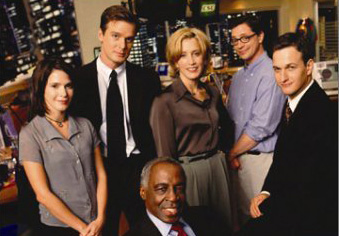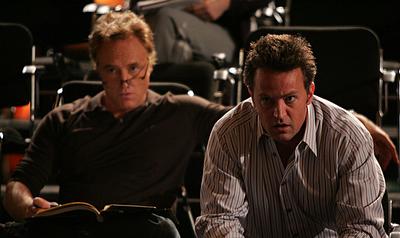 This year at the Oscars, Aaron Sorkin took home a golden statue for his screenplay for The Social Network. Odds are, Aaron Sorkin is not a name with which you are entirely unfamiliar. Even if you had no idea that he wrote The Social Network, you’ve probably either seen or, at the very least heard of, The West Wing. This long-running drama about the behind-the-scenes goings on of the White House and the president’s inner sanctum was as critically acclaimed as it was commercially successful.
This year at the Oscars, Aaron Sorkin took home a golden statue for his screenplay for The Social Network. Odds are, Aaron Sorkin is not a name with which you are entirely unfamiliar. Even if you had no idea that he wrote The Social Network, you’ve probably either seen or, at the very least heard of, The West Wing. This long-running drama about the behind-the-scenes goings on of the White House and the president’s inner sanctum was as critically acclaimed as it was commercially successful.
Unfortunately, and despite the naked, gold man now staring back at him from his mantle, success is something that often eluded Sorkin early on; especially in the realm of television. In addition to The West Wing, Sorkin produced two shows, Sports Night and Studio 60 on the Sunset Strip, that didn’t make it past a second or even an inaugural season respectively. Even if you don’t count yourself an avid fan of Sorkin, these two shows are sterling examples of top-notch television demanding and deserving of your attention.
Sports Night and Studio 60 both revolve around the high-stress world of producing live television shows; something clearly residing comfortably inside Sorkin’s wheelhouse. Sports Night, as its name suggests, takes place in the universe of late-night sportscasting. The lead anchors of this third-place highlight show are Dan Rydell (Josh Charles) and Casey McCall (Peter Krause). Charles is probably best known for his adolescent turn as Knox Overstreet in Dead Poets Society while Krause forced us all to take notice as one of the leads in HBO’s Six Feet Under. The two of them have the amazing back-and-forth chemistry of lifelong friends and they lend a certain unique and honest perspective as to how the on-air camaraderie of sportscasters can be informed by their history together.
What’s interesting about Sports Night is that it features many of the great Sorkin tropes but presented in such a way as to demonstrate how clueless the networks initially were as to how to package his comedies. This was his first show, and his style was clearly at odds with the ABC sitcom blueprint. Despite the breakneck conversational tennis match that comprised almost all of the dialogue and the severity of the drama into which it often chose to delve, Sports Night is the only Sorkin series to feature a laugh track. It could not feel more like a producer’s note and gives certain moments of the series a very inauthentic quality. Despite this misstep, Sports Night is an amazing viewing experience that adroitly juggles heavy drama with cathartic humor. Luckily, the laugh track doesn’t last…unfortunately neither did Sports Night.
After Sorkin’s first run at TV fell flat, he effectively chalked up a win in this column with The West Wing. As if endowed with a renewed confidence in his roots, Sorkin unleashed Studio 60 on the Sunset Strip, which chronicled the inner workings of a weekly comedy variety show. Much like Sports Night, Studio 60 features an outstanding ensemble cast anchored by two creative characters that are also lifelong friends. In this case, they are two comedy writer/producers played by Bradley Whitford and Matthew Perry. The way these two work off each other is an extension of the relationship between Dan and Casey on Sports Night and arguably an improvement upon it. Studio 60 also benefits from the fact that most of its character roster is made up of people who work in comedy so the laughs are effortless at times, but shockingly and intensely layered at others.
 There are two big differences between Sports Night and Studio 60. The first is that by the time Sorkin made Studio 60, he had really hit his stride and the network knew exactly how to present his material for maximum effect…or so they thought. There is no laugh track in Studio 60 and the drama is as warmly embraced as a pratfall or one of Matthew Perry’s signature buffoonish double-takes; one of my favorite things about his style of comedy.
There are two big differences between Sports Night and Studio 60. The first is that by the time Sorkin made Studio 60, he had really hit his stride and the network knew exactly how to present his material for maximum effect…or so they thought. There is no laugh track in Studio 60 and the drama is as warmly embraced as a pratfall or one of Matthew Perry’s signature buffoonish double-takes; one of my favorite things about his style of comedy.
The second difference between the two is inherent in the pilot episodes. In Sports Night, we sort of hit the ground running with an entity (the show within the show) that is already well established and constantly moving so we are introduced in the middle of the story and have to hold on for the ride. Studio 60 on the other hand starts with the colossal collapse of the show within the show and the network’s desperate race to save it from extinction. We are forced to watch something rise from absolute ruin piece by piece. This upheaval accounts for the punch-in-the-gut of what I truly feel is one of the greatest pilots of all time.
So if it’s so good, why was Studio 60 binned after one season? Turns out somebody at NBC had the brilliant idea to launch Studio 60 at exactly the same time as 30 Rock. So audiences were forced to choose between a wacky, broadly drawn show (but still well-written to give credit where credit is due) loosely based on SNL and a cerebral, highbrow deconstruction of SNL. You do the math. While Studio 60 was just removed from Netflix Instant, both seasons of Sports Night were recently added. It would behoove you to shell out a few coins to purchase the first, and only season of Studio 60 and give Sports Night a spin on Netflix. These two shows represent the great potential of television writing, especially in the hands of a mad genius like Aaron Sorkin.


